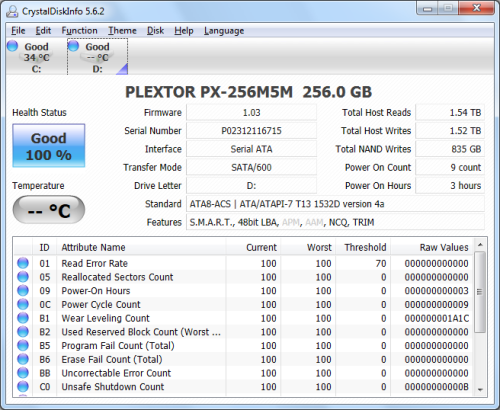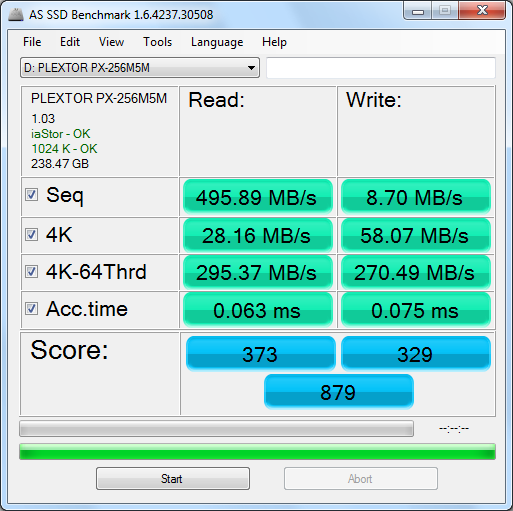TRIM and True Speed:
While SSD's offer many benefits, there are some downsides to using flash memory. One of the biggest issues people run into is performance degradation. Over time, an SSD will run out of fresh blocks and will have to write over data the file system has marked as deleted. This procedure is very complicated and can slow an SSD's write speeds considerably.
To fix this problem, most manufacturers have added TRIM support to their SSDs. The TRIM command allows an operating system, such as Windows 7, to tell an SSD which data blocks are no longer in use. Using this information, the drive pro-actively erases these blocks and adds them to the free block pool.

The M5M is the latest drive to ship with their Plextor's exclusive True Speed technology. By leveraging the power of advanced firmware, True Speed ensures that the SSD works at its full potential even after extensive use and long periods of operation. Along with support for TRIM, the M5M's firmware incorporates Plextor's Bad Block Management, Global Wear Leveling and Instant Restore technologies. Where Bad Block Management and Global Wear Leveling optimize the way data is written on the drive, Instant Restore maintains "like new" performance by reorganizing data to maximize the number of free cells.
Plextor's True Speed technology works very well, as I saw very little performance degradation, even after hours of testing. I was finally able to overwhelm it by using Iometer to fill the entire drive and then running a random write test for 30 minutes. This had little impact on the PX-256M5M's read speed. However, its average writing speed dropped to 34.5 MB/s when in this "dirty" state.

Plextor PX-256M5M - Dirty
I let the computer sit for a few hours and then reran the test. Looking at the screenshot below, you can see that the PX-256M5M's average write speed had increased to a mere 40.8 MB/s. Needless to say, this was not the result I expected, especially when you consider how well Plextor's other SSDs have done in this test.

Plextor PX-256M5M - After TRIM
The only thing I can figure is that, like the M5Pro Xtreme, the M5M is using a new garbage collection algorithm which can only partially restore the drive's performance. To fully restore the M5M you need to trigger TRIM and, for whatever reason, this was not happening in our tests.
With this in mind, I went back and reran the test using AS SSD instead of HD Tach. AS SSD isn't as low level as HD Tach nor does it produce a nice looking graph. However, it does let us test a drive's read and write speeds without having to delete the volume. Once again, I used Iometer to fill the PX-256M5M and put it into a "dirty" state. This had very little effect on the drive's read speed. However, its sequential write speed dropped to 8.70 MB/s

Plextor PX-256M5M - Dirty
I let the computer sit for about 30 minutes and then reran the test. Looking at the screenshot below, you can see that the PX-256M5M's average write speed had increased to 415.23 MB/s.

Plextor PX-256M5M - After TRIM
Lastly, I used Plextor's Plextool software to perform a secure erase of the PX-256M5M. With the drive wiped clean, it had average read and write speeds of 512.17 MB/s and 420.18 MB/s, respectively.

Plextor PX-256M5M - Secure Erase
Final Thoughts:
Plextor's new M5M series SSD is proof that good things do come in small packages. This pint-sized powerhouse combines Marvell's new 88SS9187 controller with Toshiba's 19nm Toggle Mode NAND flash to deliver a fast, responsive computing experience. In our sequential read and write tests, the PX-256M5M was able to read at speeds as high as 538 MB/s and write at speeds in excess of 408 MB/s. It also did reasonably well our random write tests, producing more than 56,000 IOPS at low queue depths. Given, these numbers aren't as high as what we saw with the M5Pro Xtreme. However, they're still pretty impressive, especially for an mSATA SSD.
Impressive performance isn't the only thing the M5M has to offer. The drive supports Plextor's exclusive True Speed technology, which does an excellent job of maintaining original performance levels, even after intensive use and long periods of operation. The M5M also features Plextor's True Protect double-data protection technology, which provides integrity checking for long-term data accuracy and 256-bit AES full disk encryption for data confidentiality. Last but not least, the M5M supports the new SATA Device Sleep (DEVSLP) standard which extends the battery life of a device by reducing the drive's power consumption when its not in use.
The M5M is available now in 64GB, 128GB and 256GB capacities. Prices on Amazon.com currently range from $75 up to $200 for the 256GB version reviewed here.

Highs:
- mSATA form factor
- Available in 64GB, 128GB and 256GB capacities
- Excellent sequential read and write speeds
- Good random read and write performance
- Performs equally well with compressible and incompressible data
- SATA 6Gb/s interface
- Toggle Mode NAND flash
- Large DRAM cache
- Exclusive firmware with Instant Restore, Global Wear Leveling and Bad Block Management
- True Speed technology provides consistent performance, even after intensive usage
- True Protect double-data protection technology
- 256-bit AES encryption
- DEVSLP power mode
- Supports TRIM, SMART and NCQ
- Reasonably priced
- 3 year warranty
Lows:
- None

